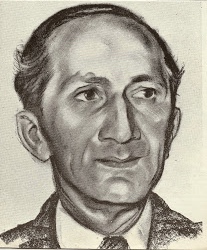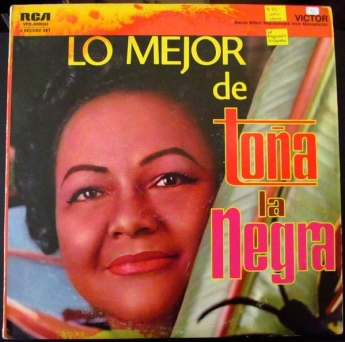Little Black Angels
(Angelitos negros)
Not many people know that Andrés Eloy Blanco, one of the most prominent Venezuelan writers of all time, was the author of the poem Angelitos negros, Little Black Angels. The poem became the lyrics of the popular song of the same name, which traversed the borders of Venezuela to re-emerge as an anthem against racism in Latin America. It was in this form that I first heard Angelitos negros, and my favourite version is the one by the Venezuelan singer Soledad Bravo. Please click here to listen to this version.

Andrés Eloy Blanco
In my previous article La Copla, I discussed the phenomenon that occurs when a piece of art is somehow appropriated by its people. Similarly, Angelitos negros [1], transcended its creator’s vision to become part of Latin American folklore.
It is said, that Andrés Eloy Blanco [2] may have been inspired by a painting located in the Macarena Basilica, in Seville. The image of the Virgen de Coromoto. Comoroto’s Virgin, Venezuela’s patron, is surrounded by angels, however there are no black angels depicted within this heavenly host.
The poem Angelitos negros starts off by describing the profound sadness of Juana, a woman of African origin, whose little son has died. The second verse is very significant as it describes the mother and her son, “consuming themselves”, suggesting that both are malnourished:
Como ella se consumía,
lo medía con su cuerpo.
Se le iba poniendo flaco
como ella se iba poniendo.
— & —
As she consumed herself,
She measured him against her body.
He was becoming as thin
As she was. [Free translation]
Juana, in the midst of the devastating pain at the loss of her son, hopes that he will be with God. A little angel in the sky, she says. The narrator of the poem counters Juana’s fervent wish; Disabuse my friend, there are no black angels.

It is, lets say, more often than not that white angels surround the Virgin in any painting.
The poet directly addresses the artists of his homeland, these painters of saints and Virgins, reproaching them that they do not paint black angels; and in failing to do so they had denied their own kind. The poem eloquently asks for equality:
No hay pintor que pintara
angelitos de mi pueblo.
Yo quiero angelitos blancos
con angelitos morenos.
There is no painter to paint
angels of my people.
I want white angels
with dark angels. [Free translation]
Andrés Eloy Blanco (1896 – 1955) wrote this poem at a time when issues of racial discrimination were not on the top of the Venezuelan political agenda. His honest views of the world gave voice against the racial discrimination perpetuated in religious art. This was, in many ways, a milestone even in the decades that followed. He remarks in the poem:
no hay una iglesia de pueblo,
donde hayan dejado entrar
al cuadro angelitos negros.
— & —
there isn’t a village church,
where they have allowed
black angels to be painted. [Free translation]
Andres Eloy Blanco is considered to be one of the most talented Latin American poets whilst simultaneously being an adept lawyer and politician. His polemical discourse portrays his concerns about his country and world affairs, which ultimately led him into exile.
Francisco Camacho, Venezuelan university professor, stated that Andres Eloy Blanco lent his poetic talent to those who had no voice and that they could see themselves reflected in his verses [3]. Some political and literary commentators compare this song with the speech of Martin Luther King I have a dream. Andrés Eloy Blanco always condemned intellectual opportunism and had an uncompromising view of the world where ethics should not be negotiable.

Cover of The best of Toña “La Negra”.
The Mexican singer Toña “La Negra” (1912 -1982) was the first to interpret the song Angelitos negros, followed by the Mexican actor and singer Pedro Infante (1917-1957). In order to listen to the version of Toña “La Negra” please click here and for the version of Pedro Infante in the 1946 film Angelitos negros, please click here.
The version sung by Antonio Machín (1903-1977), a Cuban singer, is considered by many to be the best version and it has retained its popularity to this day. However, many other very interesting versions have been recorded over the years keeping this song alive. Please click here for the version of Antonio Machín with the lyrics in Spanish.
Spanish, like the English language, has had a global impact due to its history of proactive colonisation. The power of a word is such that a language mirrors and transmits cultural and moral values of a society, reinforcing them. Angelitos negros is a good example where the model of exclusion is applied in religious art.

Pedro Infante in the 1948 film Angelitos negros.
In 1492, the Spanish Empire began their process of expansion, known as “colonization”. In Latin America the Spanish Empire established a model of exclusion of African and indigenous peoples based upon a racial hierarchy, which still prevails to this day. The use of words such as mulatto (mulato in Spanish), mestizo (mestizo in Spanish) and black (negro) have been part of a large jargon of words which stigmatize, to economically exclude these social ethnic groups.
This “concept of races” and racial stratification perpetuated economical exclusion and has brought devastating consequences to the indigenous and black communities in Latin America to this day.
Angelitos negros gives us another great opportunity to explore different variations of a song to discover which of the many versions is our favourite one. I would like to invite you to surf on YouTube and find your favourite version. Have you found one that you would like to share with us? Please add it below with your comments.
January 2016
Footnotes
[1] For an electronic copy of the poem Angelitos negros in Spanish, please click here.
[2] For further information on the life and works of Andrés Eloy Blanco, please click here to a pdf in Spanish of his biography: Andrés Eloy Blanco y la posteridad, Andrés Eloy Blanco and Posterity, by Oscar Sambrano Urdaneta, Universidad Nacional Abierta.
[3] Free translation from: Prestó su talento el poeta para que los que no tenían voz se vieran reflejados en sus versos. Fragment from Andrés Eloy Blanco: periodismo, modernidad, y política en la Venezuela de la primera mitad del siglo XX, page 22, Profesor Francisco Camacho, Instituto Universitario Experimental de Tecnología Andrés Eloy Blanco. Barquisimeto, Universitary Experimental Institute of Technology Andrés Eloy Blanco, Venezuela.
¡Amigo! Son una biblioteca y un universo. No conocía (¡mirá que ignorante y cómo me ilustrás!) ni canción, ni versiones ni la historia del autor hasta que te hube leído.
Besos y abrazos desde el país.
LikeLike
Hola Vero, gracias por tus comentarios.¿Has encontrado tu versión favorita de Angelitos negros? Tengo una copia de su libro Poesía, si quieres te lo puedo enviar. Estoy seguro que disfrutarás de su lectura.
Andrés Eloy Blanco,¡qué poeta! Fue miembro de la Generación del 28 y también fue cuentista, dramaturgo, ensayista, político y orador. Él tenía su columna titulada Puerta sin llave en El Universal. En diciembre de 1945, escribía:
Yo mismo, que debo lo mejor del poco o mucho nombre de que gozo, a la Poesía, siento a veces que llevo demasiado tiempo fuera de ella. He abandonado la vida de poeta. No quiere esto decir que ya no escriba versos. Siempre los escribo; los escribo continuamente; pero siempre en las horas que me deja libre la política. No vivo en diferenciación; y no ha sido voluntad mía. Entré a la lucha política muy joven; y la realidad me obligó. A veces quisiera volver plenamente a la literatura; pero si me decidiera a hacerlo, quizá no podría; no es que me llamen las multitudes en calidad de líder político; es que mientras haya cien hombres y cien mujeres que me pidan no abandonar un campo en el que mi palabra podría ser beneficiosa, yo no tendría derecho de desoírlos. La política, pues, me obliga como un arte.
Quizás la esfera de la política necesita de poetas. ¡Larga vida a la poesía y a los que la mantienen viva! Necesitamos de muchos Andrés y muchas Verónicas en este mundo.
Un abrazo,
Adrián
LikeLiked by 1 person
Es tiempo de revisar mi correo, me dije. Y aquí estoy para agradecer todo el cariño y la dedicación hacia mi persona. Lo mío no es para tanto. ¿O será que sí? Desde cada humilde lugar (hasta la pelusa en el bolsillo engendra poesía) sentir y dar nuevo aire al pensamiento es un gesto revolucionario. Tal vez…
Esperaré gustosa el libro, bien sabes que ahora que lo conocí ¡lo quiero!
Besos,
V.
LikeLike
Querida Vero, tu nombre se escribe con la letra V, la de la Victoria y creo firmemente en el poder transformador de la palabra y de la poesía.
Lo prometido es deuda. El libro va en camino. Espero que te guste. He leído que se iban a recopilar las Obras Completas del poeta Andrés Eloy Blanco en una edición especial como parte del homenaje a 60 años de su partida. No sé si esto se logró. Adrián
LikeLiked by 1 person
Ya averiguaremos el tema de la obra de Andrés, a ver si logramos algo. 😉
Mi querido Adrián, me permito dejarte un link a raíz del cual me acordé ayer que no te había respondido aún. Viene a cuento 😉
http://lasbalasdelcampanario.blogspot.com.ar/2016/02/politica-y-poesia.html
Beso grande.
V.
LikeLike
Valuable information
LikeLike
Thank you!
LikeLike
Thank for the information! Will discrimination have an end in the future? i’m doutfull, i’m against of all kinds of discrimination, it’s a real hard fight but we must fight against this terrible prejudice. Bye, bye.
LikeLike
Dear Meri,
I believe that each time a poem like Angelitos negros become an anthem against injustice; each time that a person like Martin Luther King raises his voice and changes begin to spark, there is hope. Perhaps the world needs more people like them.
Kind regards,
Adrián
LikeLike
a ver que te parece esta españolada
LikeLiked by 1 person
Hola Hugo, me gusta este video. Lola Flores es muy joven y muy guapa. Pero, esta es mi version favorita. ¡Viva la Paraguaya Perla!
LikeLiked by 1 person
Thanks for the link to that music, I loved it. It’s such a pity the world’s governments have never listened to people like Martin Luther King. They ignore whatever they say or suggest, which is why we have the desperate plight of people fleeing war torn lands and oppression while the world looks on and shakes it head in ‘sympathy’ but that’s about the only action it seems to take.
LikeLiked by 1 person
Thank you Jean for your very true comments.
The poem Angelitos negros sadly remains relevant today. I recall a saying in Spanish which in English more or less sounds like this: one drop is very little, but with another a downpour. To read the works of Andrés Eloy Blanco is to keep him alive.
Kind regards,
Adrián
LikeLiked by 1 person
That’s very like the saying ‘it’s only a drop in the ocean’ but the ocean is made up of many drops, so each one does count.
LikeLike
That is true, I believe that all of us are responsible to look after this wonderful world that we do not inherit from our ancestors but borrow from our children.
LikeLiked by 1 person
Hay una versión interesante : la de Eartha Kitt que conocí recientemente
bravo por tu blog y tu dedicación a los alumnos!
LikeLike
Hola Leonardo. Es una versión muy bonita de Angelitos negros.
¡Muchas gracias!
Adrián
LikeLike